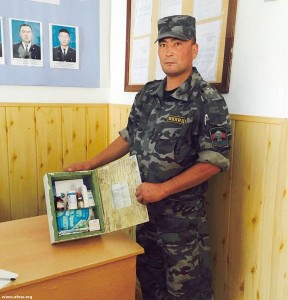 On August 26–28 AFEW in Kyrgyzstan visited Naryn and Balykchy police stations to monitor the implementation of Instruction on joint HIV prevention efforts by the police, drug control agency and punishment implementation department of Kyrgyzstan. The Instruction was developed in 2014 by national experts representing various state agencies and is meant for law enforcement bodies that interact with key populations.
On August 26–28 AFEW in Kyrgyzstan visited Naryn and Balykchy police stations to monitor the implementation of Instruction on joint HIV prevention efforts by the police, drug control agency and punishment implementation department of Kyrgyzstan. The Instruction was developed in 2014 by national experts representing various state agencies and is meant for law enforcement bodies that interact with key populations.
Monitoring visits were held in city police departments of Naryn and Balykchy and consisted of two parts: a survey of the heads of police departments and a survey of police personnel. Each monitoring visit lasted for two days. The surveys tested the awareness of police chiefs about the basics of HIV prevention, harm reduction programmes, post-exposure prevention, gender violence, as well as the actions necessary in case of accident associated with the risk of HIV transmission.
In addition, the police departments were checked for first-aid kits and information materials about HIV prevention. In total four police stations were checked, four police chiefs and 31 police personnel were surveyed.
The personnel survey was meant to check the knowledge of HIV issues, including its prevention, treatment and the practice of clients’ redirection for services. Besides, the survey checked the knowledge of law provisions that apply to key populations and gender violence. The knowledge of the Instruction was also evaluated.
After each visit representatives of the Ministry of Internal Affairs, Ministry of Health and local community organisations that work in the field of HIV prevention met to discuss the outcomes of the monitoring. A number of important suggestions were made in order to improve the implementation of Instruction’s provisions:
– Conduct training for police on gender violence;
– In each police department secure a person to be responsible for HIV prevention (ensuring compliance with the measures of safety of personnel at workplace, first-aid kit maintenance, logging cases of accidents at workplace);
– Include post-exposure prevention issues in the process of certification of police personnel;
– Strengthen cooperation between police and NGOs that work in the field of HIV prevention in order to improve the work for key populations.
The monitoring visits were held in the framework “Bridging the Gaps: Health and Rights for Key Populations” project (The Netherlands) and «Joint Efforts of Law-Enforcement Bodies and Civil Society of the Kyrgyz Republic in Combating the HIV Epidemic” (Soros Foundation in Kyrgyzstan).



